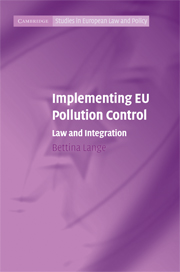Book contents
- Frontmatter
- Contents
- Series editors’ preface
- Acknowledgements
- Update on the IPPC Directive
- Abbreviations
- 1 Introduction
- 2 Traditional perspectives on the role of law in EU integration
- 3 Critical perspectives on the role of law in EU integration
- 4 What is EU ‘law in action’?
- 5 Talking interests – generating procedure: How political discourse constructs key aspects of BAT determinations in BREFs
- 6 Variation in open and closed BAT norms
- 7 What does it cost? Economic discourse in the determination of ‘the best available techniques’ under the IPPC directive
- 8 Does ‘law’ integrate? Licensing German and English coke ovens under the IPPC Directive
- 9 Conclusion
- Appendix: Methodology
- Bibliography
- Index
3 - Critical perspectives on the role of law in EU integration
Published online by Cambridge University Press: 07 August 2009
- Frontmatter
- Contents
- Series editors’ preface
- Acknowledgements
- Update on the IPPC Directive
- Abbreviations
- 1 Introduction
- 2 Traditional perspectives on the role of law in EU integration
- 3 Critical perspectives on the role of law in EU integration
- 4 What is EU ‘law in action’?
- 5 Talking interests – generating procedure: How political discourse constructs key aspects of BAT determinations in BREFs
- 6 Variation in open and closed BAT norms
- 7 What does it cost? Economic discourse in the determination of ‘the best available techniques’ under the IPPC directive
- 8 Does ‘law’ integrate? Licensing German and English coke ovens under the IPPC Directive
- 9 Conclusion
- Appendix: Methodology
- Bibliography
- Index
Summary
Introduction
While chapter 2 outlined key assumptions and elements of a traditional approach towards the role of law in EU integration, this chapter focuses on alternative critical perspectives. While there is no single unified critical perspective, some key elements of such an approach can be identified. Critical perspectives do not necessarily assume an integrative function of law. They also start to inquire into the nature of law in EU integration processes. They differ from conceptions of law as formal, instrumental and relatively autonomous state law. They abandon some of the modernist assumptions of the traditional approach and engage with post-modern ideas about the constructed nature of the social world.
This chapter argues that such critical approaches towards law and integration can be further developed. In particular, it is also necessary to explore law's relationship to its contexts, in order to understand to what extent we can really speak of a distinctly legal dimension of EU integration. Are there identifiable boundaries between law and its environments? Do we need to differentiate between macro- and micro-levels in order to answer this question? For instance, can law and its environments be linked on a micro-level? If so, how?
The first section of the chapter outlines key assumptions of certain contemporary critical approaches, while the second section discusses their main elements, in particular their questioning of the conception of law as instrumental, formal and relatively autonomous. The concluding section draws together the main points of the discussion.
Information
- Type
- Chapter
- Information
- Implementing EU Pollution ControlLaw and Integration, pp. 55 - 85Publisher: Cambridge University PressPrint publication year: 2008
